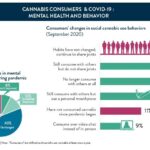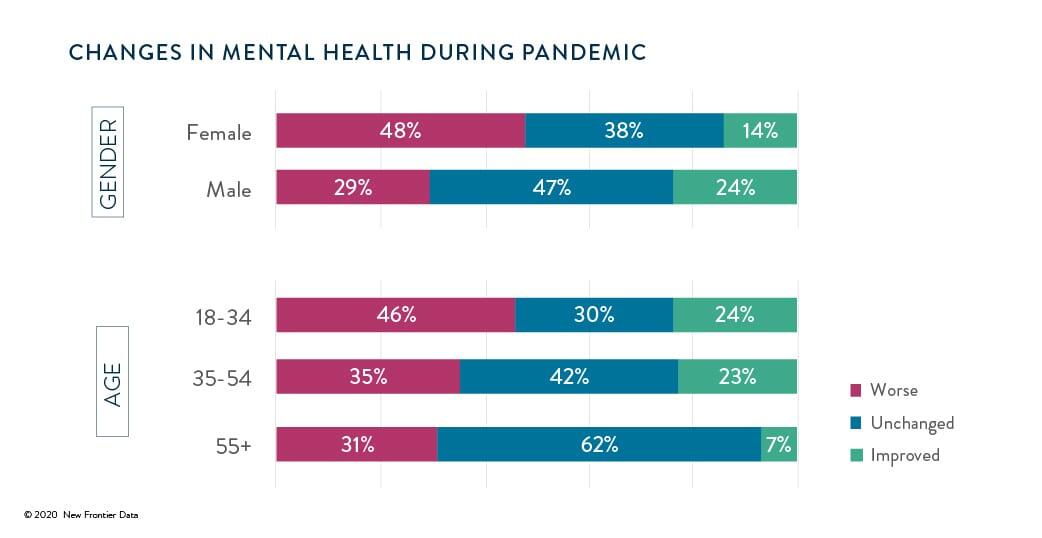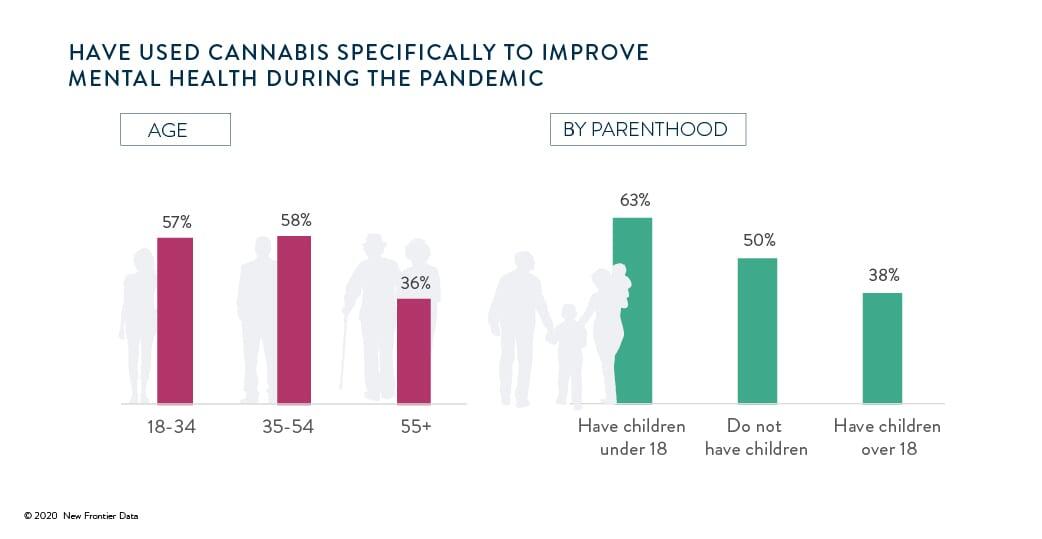COVID-19 Affects Cannabis Consumers’ Mental Health, Social Use Practices

Cannabis Consumers & COVID-19
November 29, 2020
New State Markets, California Numbers Boost Outlook for Legal Cannabis
December 7, 2020By Dr. Molly McCann, Ed.D., Director of Industry Analytics, New Frontier Data
Last week’s Cannabit explored overall changes among quantity of cannabis consumed and shifting share of product forms during the pandemic (using data from a September survey of 4,600 U.S. consumers). This week’s edition examines the survey results to gauge effects from the pandemic on social consumption practices, and consumers’ mental health. Such findings and their implications for the industry are explored more deeply in New Frontier Data’s forthcoming The Impact of COVID-19: A Supplement to the 2020-2021 U.S. Cannabis Report, due for release in December.
Pandemic precautions necessitate changes in social behaviors
Nearly all (98%) current cannabis consumers (i.e., those who consume at least once annually) reported having changed their daily social behaviors to incorporate precautions against contracting and spreading the virus, with 84% practicing social distancing, 55% self-isolating at home, and 42% only interacting with their COVID pods, i.e., limited circle of family or friends. Meantime, 72% also reported having changed the way they consume cannabis with others.
The most common modification to social cannabis use is to each consume one’s own product, to avoid sharing (26%) with contact. A smaller group (16%) continues to share smokable cannabis, but tends to use personal joint holders or mouthpieces to avoid directly sharing saliva with other consumers. About 1 in 10 have moved their consumption sessions to a video-calling platform, thus avoiding shared physical space.
Among the more extreme adjustments, more than 1 in 5 (22%) among consumers report that they no longer consume cannabis with others, and 1 in 10 (11%) no longer consume it at all. Among consumers who only used cannabis socially before the pandemic, one-third (33%) had not consumed it in more than six months since the pandemic began. That reflects a reliance of some social consumers for their friends to provide the cannabis they consume, while they rarely or never purchase it themselves.
Impact of the pandemic on consumers’ mental health varies
The pandemic and its associated effects on social and family life (as well as attendant economic disruptions and financial stress) have unsurprisingly taken some toll on most consumers. Two in 5 reported that their mental health has worsened during the pandemic, another 2 in 5 that it has stayed the same, and 1 in 5 that it has improved.

Notably, consumers of different genders and ages report widely differing mental health outcomes. Nearly half (48%) of female consumers, and 46% of those aged 18-34 have reported that their mental health has worsened during the pandemic, compared to 29% among men, and about one-third of older consumers (e.g., 35% among ages 35-54, and 31% of ages 55 and older). Young consumers and female consumers were also significantly more likely than their counterparts to report having “poor” or “fair” mental health in absolute terms.
The groups most likely to report a worsening of mental health during the pandemic (i.e., females, and consumers aged 18-34) were also those most likely before the pandemic to have used cannabis either primarily or exclusively socially (as opposed to solitarily). That is not to suggest that the post-pandemic lack of social consumption precipitated any worsened mental health for those consumers, but that higher rates of cannabis consumption with others before the pandemic indicated a stronger general tendency toward extroversion and social behavior in general, which the pandemic interrupted, likely increasing feelings of isolation and worsening emotional well-being.
Use of cannabis to manage mental health during the pandemic
Among the most common reasons consumers gave for using cannabis include promoting relaxation, reducing anxiety, and aiding sleep; for many, the pandemic has subsequently heightened those needs. More than half (52%) of consumers reported using cannabis specifically to improve their mental health during the pandemic. Those rates were higher (58%) among consumers under 55 years old, and 63% among those with children under 18 living at home.

For more findings and analysis of consumer behavior during COVID-19, please look for New Frontier Data’s forthcoming report, The Impact of COVID-19: A Supplement to the 2020-2021 U.S. Cannabis Report.




